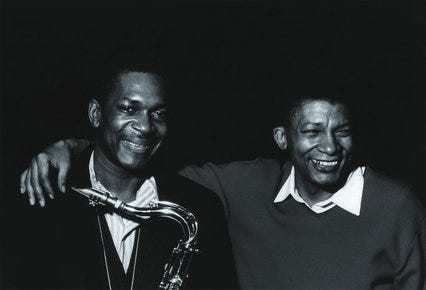
There are albums in every genre that help define that genre and set a watermark by which all other artists aspire. I say aspire rather than “are judged” because art isn’t a competition, particularly when it comes to the mercurial sand mandala that is jazz. If musicians were to step on stage or into the recording with the intention of being better than someone else, rather than being the absolute best that they can be at the moment, I can guarantee you that that performer wouldn’t be worth listening to.
I can’t think of two artists who, on the surface, are more musically opposite than Coltrane and Hartman. Coltrane, the ritualistic obsessive improvisor, who, like a monk reciting a koan a thousand times, brings us back a bit of nirvana with every solo. Listen to his seminal 1960 album, Giant Steps.
And Johnny Hartman, with his laid-back, honey-coated voice, who didn’t even consider himself a jazz singer! Here’s Hartman’s great 1957 album, All of Me — The Debonair Mr. Hartman.
And, yet, the ever searching Coltrane must’ve heard in Hartman’s voice a sound that would be a perfect foil to his tenor sax’s sound and a grounding force to his searching harmonic and melodic improvisation. It was Coltrane that suggested to his producer, Bob Thiele, that the two work together.
The album, John Coltrane and Johnny Hartman, was recorded on March 7, 1963. There are just six songs and each one is it’s own epic and myth. As the years have passed since first hearing this album, each track has come to the fore as my “favorite,” which in the end is the mark of any great work of art as it continually morphs to reflect what you’re feeling at the time. However, I have never been able to listen to any other version of, Lush Life.
